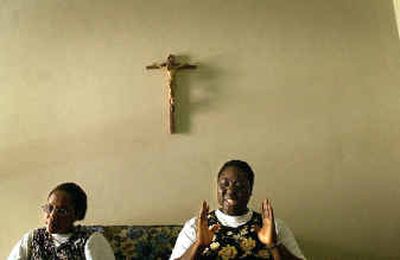Keeping their faith

In search of a cure, the two women traveled across an ocean praying for solace from their pain.
For the past three years, severe edema and excruciating aches have afflicted Sister Scholastica Yabotsi and Sister Esther Honugah, two nuns from the order of Sisters of Mary, Mother of the Church in Ghana.
They arrived in Spokane four months ago, pinning their hopes upon modern, Western medicine. But after numerous tests, X-rays and examinations by more than a dozen doctors, a cure has yet to be found. Medical experts, who have recently sent their blood work and other tests to the U.S. Centers for Disease Control in Atlanta, still haven’t been able to diagnose the mysterious illness.
Yet, as the sisters prepared for the long journey home, they had only words of gratitude for the medical community in Spokane.
“Ne meku la, na yi agble,” they said in their native tongue of Ewe, the language of Ghana’s Volta region.
It is the ultimate way to say “thank you” in their agricultural community: “If I die, go ahead and farm.” In a society where no one works whenever there is a funeral, it means that what the doctors here in Spokane have done is beyond their expectations.
“We are grateful,” Yabotsi said in English.
The two women would never have been able to seek medical treatment here in the first place had it not been for Lynn Riggins, a chaplain at Sacred Heart Medical Center and a medical missionary who has traveled to Ghana eight times.
Riggins learned about the sisters’ ailments and arranged for the women to travel to Spokane, live at the Holy Names convent and receive treatment from area doctors and medical facilities.
“It’s just part of the ministry,” said Riggins, a member of St. Charles parish in north Spokane. “I’ve been there so many times and so many of the Africans are friends of mine. They’ve become like family.”
The sisters were both stricken with their ailments in 2001. While receiving training in public health at a hospital in Accra, the capital, Yabotsi suddenly suffered pain caused by her swollen feet. The swelling gradually crept up her calves, all the way to her knees. The pain hindered her movements, eventually preventing her from accomplishing her tasks as a nurse and midwife.
Doctors in Accra administered numerous tests but found nothing. Yabotsi later discovered the swelling had affected her hands, which broke out into blisters that burst into open wounds. She spent many days with her feet and hands wrapped in mummy-like bandages.
“It was so painful,” recalled Yabotsi, 39. “It bothered my work a lot. I felt useless.”
Although Honugah had experienced lower back pain as early as 1995, the aches became unbearable in March 2001. She, too, was treated by doctors and chiropractors in Ghana, but the experts there could not comprehend the swelling in her right side and the pain that shot up her spine. It interfered with her work as an accountant at a Catholic college. Often, she couldn’t get out of bed and could only lie on her stomach.
Weakened by their ailments, the two women were sent to Sokode, home base for the Sisters of Mary, Mother of the Church. There, Sister Cecilia Clare, the mother general of the 63-member order, turned to Riggins for help.
Honugah and Yabotsi arrived in Spokane on a cold, snowy January afternoon, dressed in layers of coats and warm clothing. The weather, the food, the culture – everything was new for the two Africans.
From the moment they picked the sisters up at the airport, Riggins and his wife, Fern, became their second family. The couple cooked numerous meals of fufu, a dumpling dish, and other foods from Ghana, took them sightseeing and drove them to numerous appointments.
“It has been a nice experience,” said Honugah, describing the interaction they’ve had with the Holy Names sisters, their doctors and the people they’ve met in Spokane. “I am happy to be in America.”
All the treatment they received here was donated by the medical community – Internal Medicine Residents, Rockwood Clinic, Sacred Heart Medical Center, Inland Imaging, PAML Lab Services, St. Luke’s Rehabilitation Institute and numerous private doctors.
Medical experts here say both women have problems with unusual types of lymphodema, a swelling of the skin. Their symptoms are signs of parasitic diseases found in West Africa, according to Dr. Sam Palpant, an expert on tropical medicine and one of the specialists who treated the nuns. Honugah and Yabotsi will likely continue to experience discomfort, he said, but their illnesses will not debilitate them. He is still awaiting results from the CDC.
In the same way that the sisters have benefited from their stay in Spokane, so, too, have their doctors and others who have had the pleasure to spend time with them, said Palpant.
“There are blessings in both directions,” said Palpant, who worked for six years as a doctor for a medical mission in Kenya and Uganda. “It’s an opportunity for us as a community to interact with people in developing countries who have unusual diseases and unusual experiences. … It’s an opportunity for us to broaden the horizons of who we are.”
Palpant, who also has cared for seven foster children through Healing the Children and often treats people from all over the world, said he enjoyed hearing the sisters’ stories and learning about their backgrounds.
Yabotsi left Spokane this past week to visit relatives in Texas en route to Ghana. Honugah plans to travel back to Africa by the end of the month.
Although they are surprised and disappointed to find even U.S. medicine could not help them, they will return home with fond memories of their sojourn in Spokane. “God’s will we do not know, he has a plan for everybody,” said Honugah. “I thank God every day for the generosity of Lynn and Fern and for everything that the medical community has done for us.”